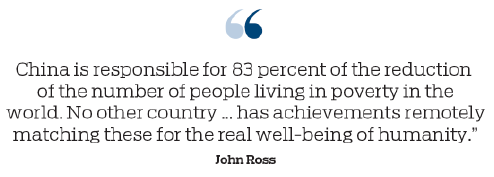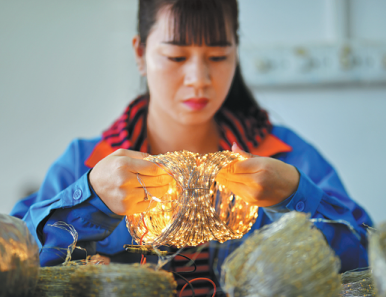In push to eradicate poverty there will be no retreat
The success of China's campaign to lift the living standards of its people, unmatched by any other country, can be chalked up as a human rights triumph, British economist says
Editor's note: As China aims to eliminate extreme poverty and be a "moderately prosperous society" (xiaokang shehui) in time for the 100th anniversary of the founding of the Communist Party of China next year, we talk to experts for their take on the country's commitment.
Lifting more than 850 million people out of poverty, as defined by the World Bank, is China's greatest contribution to global human rights, says John Ross.
"No one who is in poverty has real choices in life, no one in poverty is really free," Ross, who is a senior fellow of the Chongyang Institute for Financial Studies at the Renmin University of China in Beijing, said.
The first and most important of all human rights is to be alive, without which everything else is meaningless, Ross said, adding that the difference between poverty and prosperity is "a life and death question".
"The difference between life expectancy in a low-income economy by World Bank classification and a high-income economy is 17 years.
"Very strikingly this is almost the same difference as between the poorest and the richest parts of cities in economically advanced countries," Ross said.
However, the West, in particular the United States, has necessarily to attempt to conceal this reality, Ross said, "Because it would lead to enormous numbers of people supporting China if these facts were widely understood".
"Instead the US puts forward a totally fake and unreal concept of 'human rights' in which the most important issue is supposed to be questions such as the right to use the US censored channels Facebook and Twitter.
"Give any real person the choice 'Do you want to live 17 years longer or die 17 years earlier and use Facebook?', see what answer you will receive. Ninety-nine percent of people will decide to live 17 years longer and won't care about Facebook in that context."
The world understands just how much China's contribution to reducing human poverty is "a dagger in the heart of the fake US concept of human rights", Ross said.
China is due to complete the building of a moderately prosperous society in all respects, known as xiaokang in Chinese, this year.
The goals are to eradicate extreme poverty and to have doubled gross domestic product and per capita income since 2010.
More than three decades ago, Chinese President Xi Jinping set out to eradicate poverty when he was Party chief of Ningde city in Fujian province.
Four important principles
In his book Up and Out of Poverty, President Xi stressed four important principles: avoiding a "poverty mentality" (ie, If you believe you are poor, you will be); adopting development measures that are suited to local conditions; the importance of strong leadership and coordination; and not wasting money on grandiose projects just because they might be popular.
Ross said the country is on the brink of decisive victory in building a moderately prosperous society in all respects.
A total of 93.48 million rural residents shook off poverty from 2013 to 2019, with 13.35 million rural people being lifted out of poverty each year on average. The poverty head count ratio in rural regions fell from 10.2 percent at the end of 2012 to 0.6 percent at the end of last year.
Also, the average life expectancy of Chinese rose from 74.8 years in 2010 to 77.3 years last year.
Ross said humans have an immense number of needs and desires, ranging from basic ones such as being healthy and having enough to eat, through to the most complex in most advanced fields of human culture or science.
"Objectively, only extremely developed societies, with enormous economic and social resources, can approximately meet all these needs. But if the real meaning of the term human rights is used, it is evident that China has the best record in improving human rights in the world."
There are three aspects to this contention.
"First of all, the people lifted out of internationally defined poverty by China are more than the entire population of the European Union or the continent of Latin America, and more than twice the population of the US.
"Second, China has brought social security protection to millions of people and healthcare to over a billion, and third, China is responsible for 83 percent of the reduction of the number of people living in poverty in the world.
Real well-being of humanity
"No other country … has achievements remotely matching these for the real well-being of humanity."
The World Bank has an internationally accepted definition of a "high-income economy" of a gross national income per capita of $12,536. On that basis less than 20 percent of the world's population lives in high-income economies, but China by itself is almost 20 percent of the world's population.
On the present trajectory, China will become a high-income economy by World Bank criteria next year or the year after, Ross said. This will double the number of people in the world living in high-income economies.
"Imagine what this means in terms of human rights and human welfare. It means not only the minimum of an escape from poverty. It means a doubling of the number of people in the world who are not merely able to satisfy their basic needs but are able to enjoy social and cultural opportunities, who are able to take regular vacations, and who are able to live a life which much more corresponds to their own desires instead of being imposed on them by poverty.
"This is why China becoming a 'moderately prosperous economy' will signify a change of the entire situation of humanity in the world."
The British researcher and former politician was the first non-Chinese citizen to be appointed to a full-time post at a leading think tank in China, the Chongyang Institute for Financial Studies.
The appointment was based on his work beginning in 1992, when he predicted that China's economic reform would produce rapid economic growth. His book The Great Chess Game became the bestselling book on economic policy on Amazon China in 2016. In it Ross explained why the Chinese economy has grown so quickly.
In Ross' opinion, China has always rightly stressed it is pursuing an economic path "with Chinese characteristics".
"No country can follow any other country mechanically. But while their combination in any country is absolutely unique, the laws of economics are universal.
" (The late leader) Deng Xiaoping therefore always stressed both that China followed a situation of Chinese characteristics and that it followed universal laws of economics," he said.
China therefore carefully studied other countries' economic development models but never copied any exactly or mechanically. Other countries similarly can study and learn from China's economic policies even without applying them mechanically, he said.
"Countries which have followed this approach have had great success. For example, it is clear that Vietnam, while it never mechanically copied China, carefully studied China. Vietnam for three decades has had one of the most rapidly growing economies in the world.
"Similarly, more recently Ethiopia seriously studied China's economic policies and now has one of the fastest-growing economies in the world.
"The facts show this is the principle which needs to be followed. China's methods of poverty reduction are of direct concern in developing countries. But even in advanced economies, with a higher per capita GDP, the difference of methods used by China at different stages of development for eliminating poverty is of interest-and likely to win widespread support," he said.
"No country should mechanically follow China. Every country should study China to understand principles which may be applied in its own unique national circumstances."
The novel coronavirus outbreak has evidently struck a heavy blow to the Chinese economy, and the pandemic's indirect international consequences are creating the greatest global economic downturn since the Great Depression, which will weigh negatively on China, Ross said.
Confidence remains
However, he remains confident about China's continued and sustained development.
This year, Ross said, the centrality of poverty reduction to China's state policy was once more strongly emphasized by the report on the work of the government to this year's full session of the National People's Congress, China's top legislature.
"For this latter reason, as is well known, China took the unusual step of not setting an economic growth target for 2020. But the commitment to eliminating poverty was emphatically retained within the government's program.
"China had already made immense progress on its route to eliminating absolute poverty before this year began, and the pandemic struck, and greater efforts would be made to eliminate poverty in all remaining poor counties and villages.
"It is clear that there will be flexibility with regard to economic goals in 2020, but no retreat from the target of poverty elimination will be accepted," he said.
On his personal blog "Learning From China", Ross regularly updates his observations and views on the country.
In one article he said human well-being is the sole goal of any correct policy, and that each country has the right to pursue its national sovereignty and national culture, which is why China's "national revival" and overall human progress are inseparably linked.
Outside China, the article said, the number of people living in poverty in an economic system dominated by the US has, according to international criteria defined by the World Bank, risen in the past 30 years.
The US has waged aggressive wars in Iraq and Afghanistan in which hundreds of thousands of people died, not to speak of the war in Vietnam, in which millions of people were killed.
These facts establish beyond doubt that the US' problem with China is not "human rights", it said.
The real problem with China for US neoconservatives and their followers, he said, is that China's national revival makes it strong.

JOHN ROSS
John Ross, an observer of political and economic developments that have shaped China over recent decades, was the director of economic and business policy for the mayor of London.
He was also the first non-Chinese citizen to be appointed to a full-time post at a leading think tank in China, the Chongyang Institute for Financial Studies, Renmin University of China in Beijing.
The appointment was based on his work beginning in 1992, when he predicted that China's economic reform would produce rapid economic growth.
His book The Great Chess Game became the bestselling book on economic policy on Amazon China in 2016. In it Ross explained why the Chinese economy has grown so quickly.
panmengqi@chinadaily.com.cn


















